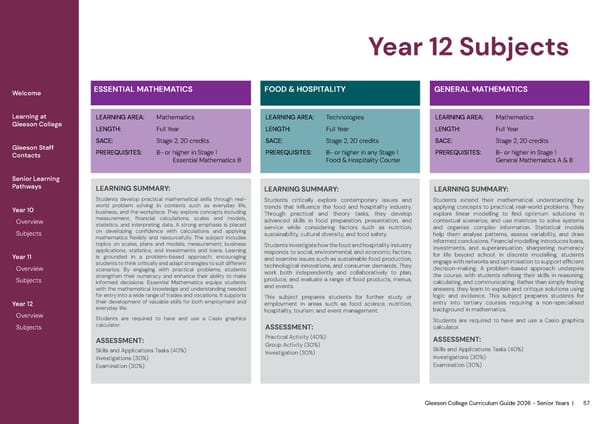Gleeson College Curriculum Guide 2026 - Senior Years | 57 Year 12 Subjects Welcome Learning at Gleeson College Gleeson Staff Contacts Senior Learning Pathways Year 10 Overview Subjects Year 11 Overview Subjects Year 12 Overview Subjects LEARNING SUMMARY: Students develop practical mathematical skills through real- world problem solving in contexts such as everyday life, business, and the workplace. They explore concepts including measurement, financial calculations, scales and models, statistics, and interpreting data. A strong emphasis is placed on developing confidence with calculations and applying mathematics flexibly and resourcefully. The subject includes topics on scales, plans and models; measurement; business applications; statistics; and investments and loans. Learning is grounded in a problem-based approach, encouraging students to think critically and adapt strategies to suit different scenarios. By engaging with practical problems, students strengthen their numeracy and enhance their ability to make informed decisions. Essential Mathematics equips students with the mathematical knowledge and understanding needed for entry into a wide range of trades and vocations. It supports their development of valuable skills for both employment and everyday life. Students are required to have and use a Casio graphics calculator. ASSESSMENT: Skills and Applications Tasks (40%) Investigations (30%) Examination (30%) ESSENTIAL MATHEMATICS LEARNING AREA: Mathematics LENGTH: Full Year SACE: Stage 2, 20 credits PREREQUISITES: B- or higher in Stage 1 Essential Mathematics B FOOD & HOSPITALITY LEARNING AREA: Technologies LENGTH: Full Year SACE: Stage 2, 20 credits PREREQUISITES: B- or higher in any Stage 1 Food & Hospitality Course LEARNING SUMMARY: Students critically explore contemporary issues and trends that influence the food and hospitality industry. Through practical and theory tasks, they develop advanced skills in food preparation, presentation, and service while considering factors such as nutrition, sustainability, cultural diversity, and food safety. Students investigate how the food and hospitality industry responds to social, environmental, and economic factors, and examine issues such as sustainable food production, technological innovations, and consumer demands. They work both independently and collaboratively to plan, produce, and evaluate a range of food products, menus, and events. This subject prepares students for further study or employment in areas such as food science, nutrition, hospitality, tourism, and event management. ASSESSMENT: Practical Activity (40%) Group Activity (30%) Investigation (30%) GENERAL MATHEMATICS LEARNING AREA: Mathematics LENGTH: Full Year SACE: Stage 2, 20 credits PREREQUISITES: B- or higher in Stage 1 General Mathematics A & B LEARNING SUMMARY: Students extend their mathematical understanding by applying concepts to practical, real-world problems. They explore linear modelling to find optimum solutions in contextual scenarios, and use matrices to solve systems and organise complex information. Statistical models help them analyse patterns, assess variability, and draw informed conclusions. Financial modelling introduces loans, investments, and superannuation, sharpening numeracy for life beyond school. In discrete modelling, students engage with networks and optimisation to support efficient decision-making. A problem-based approach underpins the course, with students refining their skills in reasoning, calculating, and communicating. Rather than simply finding answers, they learn to explain and critique solutions using logic and evidence. This subject prepares students for entry into tertiary courses requiring a non-specialised background in mathematics. Students are required to have and use a Casio graphics calculator. ASSESSMENT: Skills and Applications Tasks (40%) Investigations (30%) Examination (30%)
 2026 Gleeson College Senior Years Curriculum Guide 2026 Page 56 Page 58
2026 Gleeson College Senior Years Curriculum Guide 2026 Page 56 Page 58